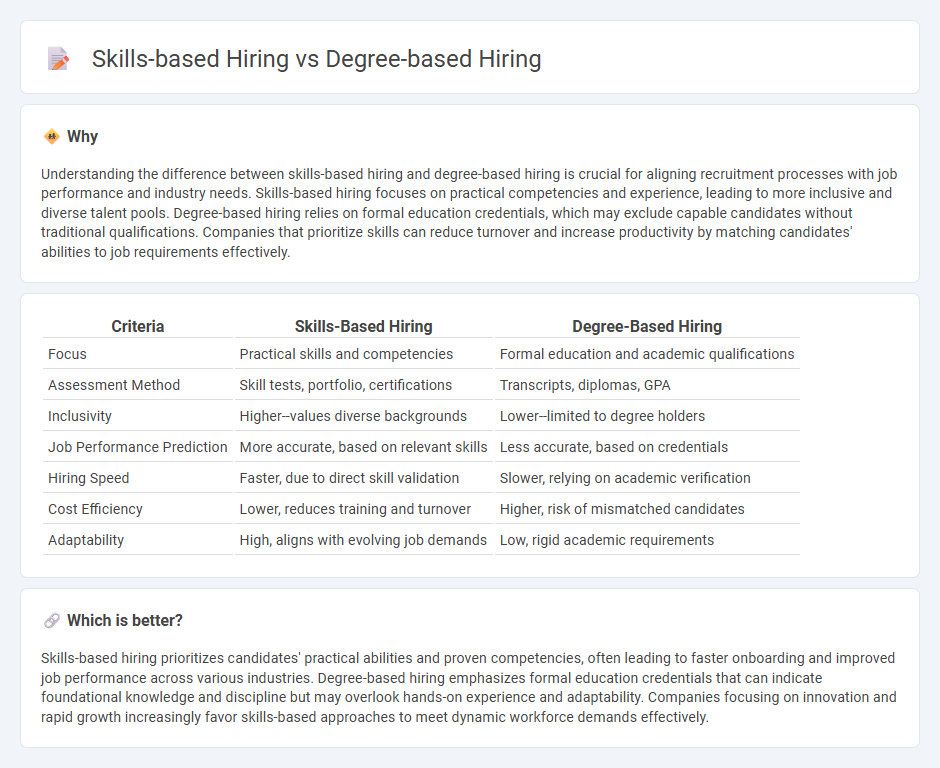
Skills-based hiring focuses on evaluating candidates' practical abilities and relevant experience rather than solely relying on academic degrees, enabling employers to identify talent with proven competencies. Degree-based hiring often emphasizes formal education credentials as a primary filter, which can overlook capable candidates lacking traditional qualifications. Explore how shifting toward skills-based hiring transforms recruitment strategies and enhances workforce diversity.
Why it is important
Understanding the difference between skills-based hiring and degree-based hiring is crucial for aligning recruitment processes with job performance and industry needs. Skills-based hiring focuses on practical competencies and experience, leading to more inclusive and diverse talent pools. Degree-based hiring relies on formal education credentials, which may exclude capable candidates without traditional qualifications. Companies that prioritize skills can reduce turnover and increase productivity by matching candidates' abilities to job requirements effectively.
Comparison Table
| Criteria | Skills-Based Hiring | Degree-Based Hiring |
|---|---|---|
| Focus | Practical skills and competencies | Formal education and academic qualifications |
| Assessment Method | Skill tests, portfolio, certifications | Transcripts, diplomas, GPA |
| Inclusivity | Higher--values diverse backgrounds | Lower--limited to degree holders |
| Job Performance Prediction | More accurate, based on relevant skills | Less accurate, based on credentials |
| Hiring Speed | Faster, due to direct skill validation | Slower, relying on academic verification |
| Cost Efficiency | Lower, reduces training and turnover | Higher, risk of mismatched candidates |
| Adaptability | High, aligns with evolving job demands | Low, rigid academic requirements |
Which is better?
Skills-based hiring prioritizes candidates' practical abilities and proven competencies, often leading to faster onboarding and improved job performance across various industries. Degree-based hiring emphasizes formal education credentials that can indicate foundational knowledge and discipline but may overlook hands-on experience and adaptability. Companies focusing on innovation and rapid growth increasingly favor skills-based approaches to meet dynamic workforce demands effectively.
Connection
Skills-based hiring focuses on candidates' practical abilities and competencies, while degree-based hiring emphasizes formal education credentials as a proxy for knowledge. Both approaches intersect as employers often use degrees to validate foundational skills, yet increasingly prioritize demonstrable expertise through skills assessments. Integrating these methods helps businesses optimize talent acquisition by balancing verified education with relevant, job-specific capabilities.
Key Terms
Credentials
Degree-based hiring prioritizes academic credentials as a primary indicator of a candidate's qualification, often emphasizing the completion of specific degrees or certifications. Skills-based hiring evaluates practical abilities and job-relevant competencies, regardless of formal education, to better match talent with role requirements. Explore how these hiring approaches impact workforce diversity and performance in today's dynamic job market.
Competencies
Degree-based hiring prioritizes academic qualifications often tied to traditional educational credentials, which may not fully capture an individual's actual competencies or job readiness. Skills-based hiring emphasizes practical abilities and specific competencies directly relevant to job performance, leading to a more inclusive and effective talent acquisition process. Explore more about how focusing on competencies can transform your hiring strategy and drive organizational success.
Job Requirements
Degree-based hiring prioritizes formal education credentials as a primary filter for job candidates, often emphasizing specific academic qualifications regardless of practical experience. Skills-based hiring centers on evaluating a candidate's relevant competencies, technical abilities, and job-specific expertise to directly match the actual requirements of the role. Explore effective strategies to align hiring practices with job requirements for optimized talent acquisition.
Source and External Links
Skills-Based Hiring vs. Degree-Based Hiring: A Comparative Analysis - Degree-based hiring selects candidates primarily based on their formal qualifications and certifications, valuing higher degrees such as master's or doctorates, and often uses AI tools to screen resumes, while education beyond high school remains important for skill development despite growing emphasis on skills-based hiring.
Skill v/s Degree-Based Hiring: Which is Best for Your Company? - Degree-based hiring refers to screening and hiring candidates based on their educational degrees, whereas skill-based hiring prioritizes actual skills, with notable companies and policymakers increasingly supporting skills over degrees to expand access and inclusivity in employment.
Skills-Based Hiring vs. Degree-Based Hiring - GoodHire - Traditional degree-based hiring focused on educational credentials as a proxy for skill, but recent trends and government policies are reducing degree requirements to avoid excluding qualified candidates and to promote diversity, especially in emerging technology roles.
 dowidth.com
dowidth.com